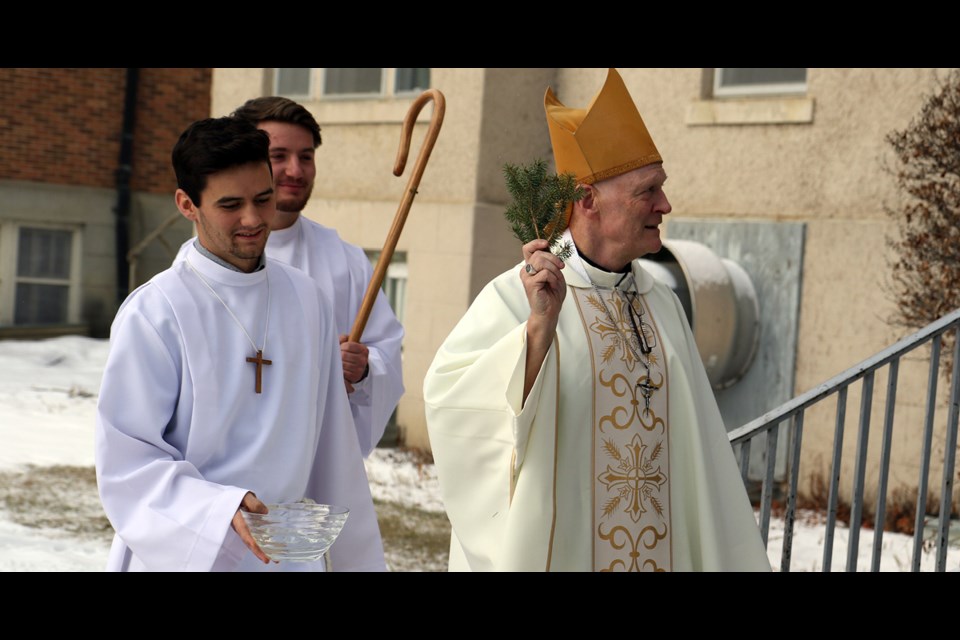BRUNO — A century ago, seeing a rapid growth in the need for education, the Ursuline sisters moved into their permanent motherhouse in Bruno. That place today remains a place of learning for youth.
“These walls, they do not make us Christian, but these walls make a bold statement,” said Vicky Serblowski, the executive director of the St. Therese Institute of Faith and Mission that now occupies the 100-year-old building, on Nov. 9.
“They make a bold statement to others, that this is our sacred space, our sacred culture and our sacred traditions.”
At the turn of the century, Abbot Bruno Doefler saw a need for an order of sisters to provide parochial learning for the growing St. Peter’s Colony. The Ursulines responded, with the first two sisters arriving from Germany in September 1913.
More and more Ursuline sisters came to the colony and soon they needed a more permanent facility to live in. They were living in quarters at what would later become Marysburg.
They chose Bruno due to the nearby Canadian National and Canadian Pacific railway lines.
“They thought, these German Ursulines, that this would be a good place to settle and have the mother house because they’d have such easy access to the railway tracks,” said Sr. Maureen Maier, who spoke on behalf of the former Ursuline residents at the 100th anniversary.
St. Bruno Parish gave the Ursulines a piece of property and $5,000 (around $74,000 in 2019 dollars) to get started. That wasn’t enough to finish the building, but a door-to-door campaign netted $2,500 (around $37,000).
On Nov. 9, 1919, Abbot Michael Ott blessed the completed building, an action that Saskatoon Bishop Mark Hagemoen would repeat 100 years later.
In 1922, the facility, as the St. Ursula Academy, began boarding and teaching female students.
At its height in the 1960s, there were more than 100 Ursulines sisters at the location.
In 1982, due to a lack of sister personnel, the school closed. The sisters lived in the building until 1999, where they moved into homes in Bruno and the surrounding area. The University of Saskatchewan leased the building for five years.
In 2007, the St. Therese Institute of Faith and Mission, which provides post-secondary programs for young adults based on Catholic Christian principles, starting operating in the building.
“There have been a lot of changes that have taken place here in the building. I would like to, at this point, commend St. Therese for keeping the building and the condition that it's in, keeping it serving a very good ministry in the church,” Maier said.
“We Ursulines are very pleased and proud about what has developed here, not just because of what we started but because of what you are doing.”
Edna Hodgson went to St. Ursula Academy for Grade 10, 11 and 12 from September 1971 to June 1975.
“I fondly recall the enthusiasm and the joy that my teachers, the Ursuline sisters, demonstrated throughout the school year,” she said, recalling plays, sporting events, classes and choral lessons.
“I appreciate the sacrifice my parents made so that my sisters and I were able to attend the school. I left St. Ursula’s Academy with a lifelong love of learning with respect and appreciation of my Catholic faith and with the joy that remains with me long after.”
Andrew Schwark, an alumni of St. Therese, came for a five-day series of intensive courses. He would go to the school for three years, something he said shows easy it is to fall in love with the place.
“I found here that the church's teachings are a lot deeper than I had thought and their deep, loving ways. That goes for the traditions and everything the church offers,” he said.
“It was a beautiful experience for me. My faith grew beyond what I thought was possible here and I'm so thankful that I could do that here.”
Kevin Pulvermacher, the chair for St. Therese’s board, said the building has good foundations – both literally and from the hundreds of students and staff that attended its halls.
“This building and this community have been blessed by the work of great community people, just like the sisters, and this continues today with the St. Therese board of directors and the dedicated staff. They do their work, not only as a job, but as a mission,” he said.
“Today, we can give thanks first and foremost to God for all the wonderful people he or she placed in this building over the past hundred years, and we pray that he continues to do so for many, many more years.”




